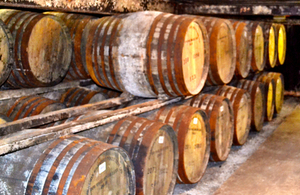Aircraft carrier to be 'christened' with Islay malt whisky
Whisky replaces traditional champagne at naming ceremony for HMS Queen Elizabeth aircraft carrier.

Bowmore whisky barrels
The naming of HMS Queen Elizabeth, which takes place this Friday (July 4th) at Rosyth, is a unique occasion of historical significance as it marks the beginning of a new era of UK carrier operations.
Workers from across the UK have contributed to the construction of the ship, but as the ship’s birth is taking place in Scotland, it is only fitting that it should be ‘christened’ with whisky, the ‘water of life’.
Bowmore Distillery, on the island of Islay, was selected as it was the first distillery Her Majesty The Queen ever visited in an official capacity.
Scottish Secretary Alistair Carmichael said:
As someone who grew up on Islay I know how much it will mean to the community to have their whisky playing a central role in such an important occasion.
World class whisky and world class shipbuilding are two of Scotland’s finest products so Friday promises to be a special day when we blend the two of them.
Speaking ahead of the naming ceremony, Defence Secretary Philip Hammond said:
This ship, the biggest the Royal Navy has ever had, is a demonstration of the UK at its very best with workers from across the Union contributing. This will be an occasion when it’s ok to spill a drop.
Ship Naming Traditions
In recent times, champagne has traditionally been used for the bottle smash during a Ship Launch or Naming Ceremony. Submarines traditionally use bottles of ‘home brew’ beer. The Naval Historical Branch confirm that there is no particular folklore with regard to the choice of one liquid over another.
Over the Royal Navy’s long history, champagne has not always been used and Nelson’s era likely used brandy or madeira.
One notable exception to the champagne tradition was HMS Sutherland in 1996, when Macallan Single Highland Malt whisky was used. Whilst unusual, this was justified due to the ship’s strong Scottish connections, including her Scottish dukedom name and affiliations to Sutherland and Scottish regiments.
There are no other records of whisky being used.
Whisky Information
Following careful consideration, a decision has been made to use whisky from the Bowmore Distillery, provided by the Worshipful Company of Distillers.
To facilitate a charitable link, the Worshipful Company of Distillers was chosen as they have selected to support the Royal Navy and Royal Marines Charity this year. The Master is a retired RN officer who has supported Royal Events in the past.
Bowmore Distillery has stood on the shores of Loch Indaal on the Isle of Islay since 1779; Bowmore was the first whisky distillery the Queen visited in an official capacity, on 9 August 1980.
The distillery will provide a bottle of their ‘Bowmore Surf’, to the Worshipful Company for the Naming Ceremony. This single malt takes inspiration from the sea; the sea spray saturates the peaty soil and a sea tang finds its way into the whisky which is a fitting tribute to the sea that shapes it.
Importantly these are important links to the Queen and sea, which serve to complement the Naming of HMS Queen Elizabeth.
Queen Elizabeth Class aircraft carrier
The QEC aircraft carriers provide the UK Government with significant strategic choice out to 2060 and the ability to influence 80% of the world’s population from a sovereign base, in support of the UK’s diverse diplomatic, security and economic interests around the globe.
Offering value for money, with their in-built military flexibility and growth potential so that defence can adapt its approach over the 50 years of the carriers’ working life, the carriers are strategic maritime platforms with wide military, polticial and diplomatic utility. As the largest warships ever built in the UK they are a great example of UK industrial excellence and ingenuity.
There are now more than 55,000 tonnes of HMS Queen Elizabeth in the dock at Rosyth. The ship is structurally complete – the installation of the aft aircraft lift on 8 May completed the assembly phase. The project is now in a highly advanced state; work continues on both carriers in six UK shipyards: Appledore, Birkenhead, Govan, Portsmouth, Rosyth and Tyne.
Work on the QE Class aircraft carriers has created/sustained between 7-8,000 jobs at the Tier 1 shipyards in Glasgow, Rosyth, Portsmouth and Devon. Over 150 equipment sub-contracts, totalling some £1.65bn, have been placed by the Aircraft Carrier Alliance to support the build of the QE Class. Throughout the supply chain 2-3,000 people are employed, boosting local economies across the UK.